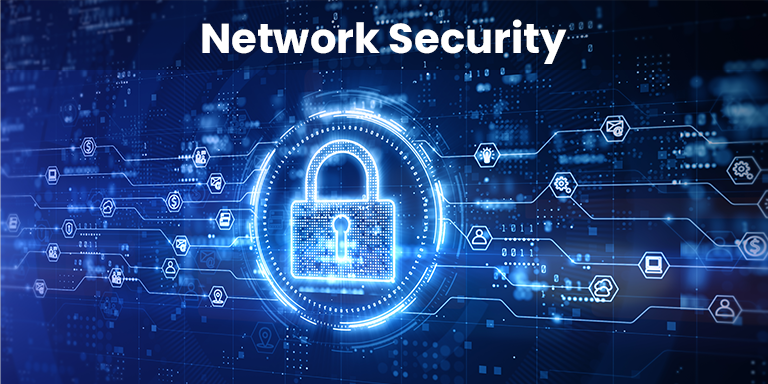
What is Network Security? Types, Techniques, and Management
Table of Contents:
- Network Security: Definition and Components
- Types of Network Security Tools, and Technique
- Make the Systems & Networks Safe
- Cyber Security Vs Network Security
The rise of modern network technologies has led to a more interconnected world. We are dependent on the internet more than ever and a large sum of personal & commercial data is being stored on either open accessible or private networks. Most of us are well aware of the importance of network security and cyber security as well as potential threats related to it, that are difficult to detect and prevent. The business-sensitive data can be protected against external attacks with the combination of network security hardware & software.
This blog will outline the principles of network security, the types, & management helpful for reducing network vulnerabilities.
Network Security: Definition & Its Different Components
The term ‘Network Security’ refers to security management in any network, whether private or public, with the help of set procedures implemented by the networking systems. It includes putting in place various countermeasures to protect the network or data stored in it. Keep the network safe from cyberattacks, hacking attempts & employee negligence with effective network security & cyber security measures in place. The emphasis is on round-the-clock monitoring of the network to prevent any sort of virus attack in the system or any misuse or modification in the database.
The use of the internet has only increased in the past decade & we are moving fast in the direction of complete digitalization. However, hackers & online attackers are also becoming smarter with time due to which emphasis is given on securing the networks. The need for network security is primarily because of two reasons – protection or recurring the business data or information from unwanted access & security of the information stored in the PC or laptops.
The need for information security is based on the below points:
- Protecting data & information against any sort of unwanted access.
- Protect your local system from Trojan horses & worms that can destroy the system.
- Protecting personal devices & PCs from the software or tool which if installed can harm the system as hackers do.
- Guards’ hardware like PCs, laptops, and hard disks from any kind of malware or virus attack. It can corrupt the system or compromise the data stored in it.
- Prevent any sort of undesired amendment to guard the business data or information.
- Prohibit a user in the network from sending mail & messages in a way it appears to the receiving party that it has been sent by some third party.
A network security system secures the integrity of an organization’s network & the devices connected to it from any unwanted intrusions. Network security comprises both hardware and software to secure the underlying infrastructure from any kind of intrusion. Network security management provides you the secured platform for connection to the network within a secured environment.
Types of Network Security Tools, and Techniques
Based on the type of attack, shield the networking systems in different ways. There are a range of network security tools and techniques that businesses can take advantage to protect against any unwanted breach.
1. DLP (Data Loss Prevention)
Businesses or organizations maintain the confidentiality of data & resources by preventing any sort of data leak. The deployment of DLP technology ensures that the network administrator is restricting the employee’s access to the data from sharing the outside work by blocking ports & sites for uploading & printing.
2. Antivirus & Anti-Malware Tool
It is the kind of software that is used for protection against malware or any kind of online attack. The protection against malware includes spyware, ransomware, worms, viruses, and more. Your networks will get affected easily by malware and then remain calm for days or weeks. The tool is best used to handle the threat by scanning for malware entry & regular tracking of files to detect the anomalies.
3. Network Segmentation
An organization is segmenting its crucial data into 2 or 3 parts & storing them in different locations. If data at any location is corrupted or deleted by a virus attack, then the reconstruction is easy with help of backup sources. Enforcing the security policies is easier with help of software-defined segmentation.
Read this also: Advantages and Components of Software-Defined Data Center
4. Mobile Security
As businesses are moving towards smartphones, Cybercriminals are increasingly targeting them. It is vital to control the devices that can access your network. It is also important to configure the connections to keep the network traffic private. To access the network safely, you should install an antivirus on the mobile & exchange the data only from reliable resources.
5. Access Control
You shouldn’t provide access control to network resources to all by deploying a password, unique user ID & authentication process for accessing the network. Set up the security parameters rightly so that businesses can prevent any kind of unwanted breach into the network.
6. Web Security
It mainly refers to provisioning limited access to websites & URLs by blocking the site that is more vulnerable to viruses & hackers. Attacks through webpages can lead to exploitation of vulnerabilities into the system and thus it is concerned with controlling web-based threats.
7. Endpoint Security
Protect your corporate networks when accessed through remote devices with help of endpoint security. The Endpoint Security is also known as ‘Network Protection’ and is available for remote devices like laptops or other wireless devices. The use of advanced level software presents seven layers of defense that include web URL filtering, firewall, antivirus, viruscope, file reputation, auto-sandbox, & host intrusion prevention.
8. VPN (Virtual Private Network)
The systems are made highly secure with VPN networks! It includes encryption methods for authentication & floating data traffic over the internet to a remotely connected network or device. A VPN is the type of network security that is encrypting a connection from an endpoint to a network. Furthermore, a VPN connection establishes a secure network connection that gives you access to the internet.
9. Firewalls
It is an integral part of the network system and acts as the wall between two networks or devices. The set of pre-defined rules are used to prevent the network from unauthorized access. The firewalls can be both hardware and software. The hardware firewall acts as the gateway between two network systems & their resources. Whereas the software firewall is the system to provide a shield to different kinds of attacks as they filter.
10. Email Security
The hackers & attackers induce the virus or malware in the network by sending emails. A highly skilled email security applicant will help you scan the incoming message for viruses & has the capability of filtering suspicious data & control the outflow of a message to prevent any kind of information loss.
How to Make the Systems and Networks Safe
To manage network security protection rightly, it is important to put measures in place to prevent the occurrence of vulnerabilities. Network security management is helping to deal with all possible network attacks & virus problems in a quick time.
The key parameters to make the system safe are:
Setting Up Strong Passwords:
Put a strong password in your system for login & the password should contain symbols, characters, & numbers to make the job hard for hackers to break into the system.
The Establishment of a Firewall:
A strong & highly performing firewall in the networking system will prevent unwanted access or other threats.
Installing the Right Antivirus Protection:
It is important to install the system & laptop with the antivirus software as it will scan, spot, & filter the infected files. Prevent any kind of virus attack by installing the right kind of antivirus.
Having Control Over Removable Media:
The scanning of removable devices like pen drives & data cards will be induced in the system. The use of removable devices should be limited, and a policy needs to be made through the export of data from the system.
Smart Surfing of Webpages:
One wrong click can lead to a virus or malware invitation on the network. Download the data from the trusted website & secure links to avoid surfing on unknown links & websites.
On-time Backups:
It is important to take period backups of files, documents, and important data in the system. Save the backup to a centralized server or other secured location.
Cyber Security Vs Network Security
| Cyber Security | Network Security |
| Cyber security is a subset of Information Security. | Network security is a subset of Cyber Security. |
| This protects against the cyber-attacks. | It protects from the DOS attacks. |
| It protects internet-connected systems & networks from digital attacks. | This protects files & directories in a network of computers against misuse, hacking & unauthorized access. |
| Cyber security ensures to protect entire digital data. | Network security protects the transit data only. |
| It protects the data inside the devices and servers. | It protects the data flowing over-the-network. |
You might also like: Expert Cyber Security Solutions to Consider in 2022
Final Thoughts!
Computer network security is one of the best things in protecting the integrity of an organization’s network & devices connected to it. Make sure you control access to networks so that hackers aren’t able to break into the system. Set the right kind of password for hardware or network so that it is not breached by thefts.
Network security can be maintained with the latest patch updates, use of complex passwords, securing the VPN & controlling the user access privileges. Make sure you contact the right kind of network security providers to enhance the level of security within networks.
FAQs
What is Used to Protect Transmitted Data in a VPN
To protect the transmitted data in a VPN, encryption is used. It allows only the approved computers with the right decoder key to read and use it. For instance, end-to-end encryption is used to secure every email and chat message that we usually send and receive.
Why is Network Security Important
Network security is important because it protects sensitive data from cyber threats and also ensures that the network is trustworthy and dependable. Most places with high-speed internet have one or more wireless routers, which can be vulnerable to attacks if they are not fully secured. Hence, a strong network security system can reduce the risk of theft and data loss, preventing it from tampering.
What Protects Network from Outside Internet
The Firewall protects the network from outside internet access by filtering unauthorized access to the data. An antivirus program only detects hazardous viruses but can never prevent unauthorized access by remote attackers.
What are the Best Practices for Network Security
Best practices that should be followed for your network security are:
- Perform a network audit and check security controls/devices
- Disable file sharing features
- Back up the data and keep a recovery plan too
- Update antivirus and anti-malware software
- Secure your routers, use a private IP address
- Establish a network security maintenance system
- Network segmentation and segregation are a must-do






